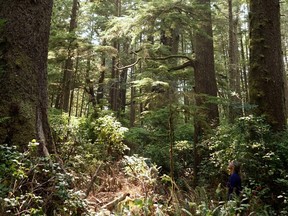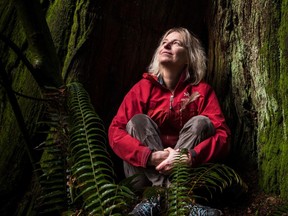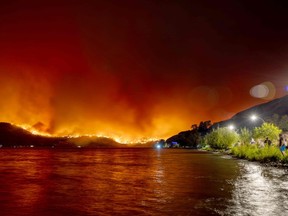Here’s your weekly roundup of local and international climate change news for the week of April 15 to April 21, 2024.

Article content
Here’s all the latest news concerning the climate crisis, biodiversity loss, and the steps leaders are taking to address these issues.
In climate news this week:
Article content
• Climate change to cause $38 trillion a year in damages by 2049
• She speaks for the trees: UBC’s Suzanne Simard named one of TIME’s 100 most influential people
• Deadly heat wave surges through West Africa
Advertisement 2
Article content
Human activities like burning fossil fuels are the main driver of climate change, according to the UN’s Intergovernmental Panel on Climate Change. This causes heat-trapping greenhouse gas levels in Earth’s atmosphere, increasing the planet’s surface temperature. The panel, which is made up of scientists from around the world, has warned for decades that wildfires and severe weather, such as B.C.’s deadly heat dome and catastrophic flooding in 2021, would become more frequent and more intense because of the climate emergency. It has issued a “code red” for humanity and warns the window to limit warming to 1.5 C above pre-industrial times is closing.
But it’s not too late to avoid the worst-case scenarios.According to NASA climate scientists,if we stopped emitting greenhouse gases today, the rise in global temperatures would begin to flatten within a few years. Temperatures would then plateau but remain well-elevated for many centuries. Check back here each Saturday for more climate and environmental news or sign up for our new Climate Connected newsletter HERE. (Source: United Nations IPCC, World Meteorological Organization, UNEP, Nasa, climatedata.ca)
Climate change quick facts:

Article content
Advertisement 3
Article content
Latest News
Climate change to cause $38 trillion a year in damages by 2049
Climate change will inflict losses to the global economy worth an annual $38 trillion by 2049, as extreme weather ravages agricultural yields, harms labor productivity and destroys infrastructure, according to researchers at the Potsdam Institute for Climate Impact Research (PIK).
Planetary warming will result in an income reduction of 19% globally by mid-century, compared to a global economy without climate change, according to research published in Nature on Wednesday. The paper uses data from more than 1,600 regions worldwide over the past 40 years to assess future impacts of a warmer planet on economic growth.
“Climate change will cause massive economic damages within the next 25 years in almost all countries,” Leonie Wenz, the scientist at PIK who led the study, said in a statement . “We have to cut down our emissions drastically and immediately – if not, economic losses will become even bigger in the second half of the century, amounting to up to 60% on global average by 2100.”
Human-made greenhouse gas emissions have warmed the world about 1.1C on average since pre-industrial times, leading to extreme weather events that cost about $7 trillion over the past 30 years, according to Bloomberg Intelligence. Climate damages keep rising, averaging $500 billion a year — or 2% of the US GDP — since 2016. Developing nations that contributed less to global warming are bearing the brunt of losses and damages.
—Bloomberg News
Deadly heat wave in Africa ‘impossible’ without human-caused climate change: study
A deadly heatwave in West Africa and the Sahel was “impossible” without human-induced climate change, scientists with the World Weather Attribution say in a new study.
Temperatures soared above 48 C in Mali last month with one hospital linking hundreds of deaths to the extreme heat.
Extreme 5-day maximum heat as rare as the observed event over Mali/Burkina Faso would have been 1.5 C cooler and 1.4 C cooler over the larger Sahel region if humans had not warmed the planet by burning fossil fuels, the study says.
The study also assessed whether the current El Niño event had an influence on the extreme temperatures and found that while there is some contribution it is small compared to human-induced climate change, explaining about 0.2 C of the observed 5-day heat event.
Rapid urbanization and loss of green spaces in cities such as Bamako and Ouagadougou have increased the urban heat island effect, the study said.
—Tiffany Crawford
Labourers and street vendors in Mali find no respite as deadly heat wave surges through West Africa
Street vendors in Mali’s capital of Bamako peddle water sachets, ubiquitous for this part of West Africa during the hottest months. This year, an unprecedented heat wave has led to a surge in deaths, experts say, warning of more scorching weather ahead as effects of climate change roil the continent.
The heat wave began in late March, as many in this Muslim majority country observed the holy Islamic month of Ramadan with dawn-to-dusk fasting.
On Thursday, temperatures in Bamako reached 44 C and weather forecasts say it’s not letting up anytime soon.
The city’s Gabriel-Toure Hospital reported 102 deaths in the first four days of the month, compared to 130 deaths in all of April last year. It’s unknown how many of the fatalities were due to the extreme weather as such data cannot be made public under the regulations imposed by the country’s military rulers.
Cheikh A Traore, Mali’s general director for health, said significantly more elderly people have died during this period although there were no statistics available due to the measures.
—The Associated Press

Advertisement 4
Article content
Meet the Vancouver scientist whose work could help fight forest fires, save old-growth
Growing up in rural B.C., Suzanne Simard would lie on the forest floor and stare up at the giant trees towering above.
Yet it was the other world below that floor that would ignite her curiosity, and lead to a life-changing discovery about how trees communicate.
Simard, a forestry professor at the University of B.C. and award-winning author of Finding the Mother Tree, has been named one of Time magazine’s 100 Most Influential People of 2024.
“I’m just thrilled but I can’t believe it was me,” she said Friday. “I was just this bush kid…and then I went to university and discovered you could take a forestry degree and classes on soils.”
Over the years of research at UBC, Simard and teams of graduate students documented how trees talk to each other via vast networks of mycorrhizal fungi, and found they not only use these pathways to share nutrients, but information about disease and drought.
It’s long been known by Indigenous people that trees are connected to a mycelium network. There are previous studies about this fungi-tree symbiosis, which is hundred of millions of years old. However Simard’s research went further and changed the way the forest is viewed — not as a collection of individual trees competing for light and nourishment, but as an integrated community that shares information.
“We figured out that carbon, water and nitrogen moves between the trees and that they are moving it back and forth between them. So now we see this sort of like a society of trees that are exchanging resources and information,” she said.
—Tiffany Crawford
Earth Day 2024: Here’s a list of things to do in Metro Vancouver
It’s Earth Day on Monday.
From nature walks and cleanup efforts to parties for the planet, there are many events happening around Metro Vancouver to honour this blue-and-green ball of stardust we all call home.
Many of the events are planned for the weekend before or after April 22, so mark your calendars.
Here is a list of some of the events happening around the region:\
—Tiffany Crawford

Advertisement 5
Article content
Canada’s 2024 wildfire season expected to be even worse than last year’s
Last year’s wildfire season broke records for its intensity and resulted in Canada’s first-ever evacuation of an entire capital city — Yellowknife. Smoke from the fires also impacted air quality not only nationally, but in the United States as well. Coming out of an intense season that garnered internal attention, federal officials are warning Canadians to prepare for another record-breaking year.
Due to a mild winter and warmer year, this wildfire season is looking to be worse, not better, than the last. Here’s what to expect for the spring and summer, what to know about the fires, and how officials are preparing for what’s to come.
“The temperature trends are very concerning. With the heat and dryness across the country we can expect that the wildfire season will start sooner and end later and potentially be more explosive,” said Minister of Emergency Preparedness Harjit Sajjan, at an April 10 technical briefing.
Early spring forecasts predict an above normal fire risk for western Canada, eastern Ontario, and southern Quebec in April. In May, the Prairies, eastern and southern British Columbia, northern Ontario, and western Quebec will be affected. Looking into the summer, long-range fire forecasts are unclear, as forecasting the precipitation that affects these conditions is difficult.
The warm fall and winter conditions throughout the country, as well as droughts, and minimal snowfall are all factors that contribute to a more intense fire season. Next to no snowfall from December to February in essential areas like southern B.C. and the Prairies impacted the moisture levels of the soil, and also increased the fire risk.
—The National Post
A storm dumps record rain across the desert nation of UAE and floods Dubai’s airport
The desert nation of the United Arab Emirates attempted to dry out Wednesday from the heaviest rain ever recorded there after a deluge flooded out Dubai International Airport, disrupting flights through the world’s busiest airfield for international travel.
The state-run WAM news agency called the rain Tuesday “a historic weather event” that surpassed “anything documented since the start of data collection in 1949.” That’s before the discovery of crude oil in this energy-rich nation then part of a British protectorate known as the Trucial States.
Rain also fell in Bahrain, Oman, Qatar and Saudi Arabia. However, the rains were acute across the UAE.
One possible contributor may have been “cloud seeding,” in which small planes operated by the government fly through clouds burning special salt flares. Those flares can increase precipitation.
Several reports quoted meteorologists at the National Center for Meteorology as saying they flew six or seven cloud-seeding flights before the rains. Flight-tracking data analyzed by The Associated Press showed one aircraft affiliated with the UAE’s cloud-seeding efforts flew around the country Monday.
—The Associated Press
Climate change’s ‘physical risks’ are catching up with banks
As the world veers further off course from its goal of limiting global warming to 1.5C above pre-industrial levels, banks are increasingly having to pay attention to the financial implications of a rapidly-warming planet.
The economic shocks inherent to the current trajectory of global warming may leave banks facing loan losses and impaired balance sheets. The Basel Committee on Banking Supervision has said climate change has the potential to affect “the safety and soundness of banks and the stability of the broader banking system.”
Until recently, banks have mainly focused on what so-called transition risks mean for their underlying business. These risks are tied to changes in asset values and other costs associated with the decarbonization of the global economy.
But as temperatures soar around the world, triggering a deadly cocktail of wildfires, storms and drought, banks are now being forced to pay greater attention to what are known as “physical risks.”
The potential losses from extreme events and long-term changes in weather patterns are becoming more prominent, forcing the financial industry to “sharpen its understanding” of physical risks, said Gianluca Cantalupi, head of climate, nature and social risk at JPMorgan Chase & Co.
And there’s little secret why. Here are just some of the recent calamities: Floods in Pakistan wiped out 2.2% of the country’s gross domestic product in 2022; Canada’s worst wildfire season on record in 2023 took a heavy toll on the local economy; and a crippling drought at the Panama Canal has impaired a waterway that handles $270 billion a year in global trade.
—Bloomberg News
Social Media
Advertisement 6
Article content
Advertisement 7
Article content
Guides and Links
B.C. Flood: Read all our coverage on the Fraser Valley and beyond
Frequently asked questions about climate change: NASA
What is climate change? A really simple guide from the BBC
Climate change made B.C. heat wave 150 times more likely, study concludes
B.C.’s heat wave: Intense weather event is linked to climate crisis, say scientists
Expert: climate change expected to bring longer wildfire seasons and more area burned
Bookmark our website and support our journalism: Don’t miss the news you need to know — add VancouverSun.com and TheProvince.com to your bookmarks and sign up for our newsletters here.
You can also support our journalism by becoming a digital subscriber: For just $14 a month, you can get unlimited access to The Vancouver Sun, The Province, National Post and 13 other Canadian news sites. Support us by subscribing today:The Vancouver Sun|The Province.
Article content



